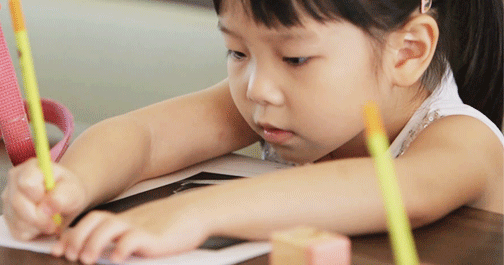As a parent, you watch with joy as your preschool child grows — from when he or she first learned to write his or her own name to now, when you are preparing him or her for Primary 1.
But is your child prepared for Primary 1?
Entering primary school can be a challenge for both you and your child as your young one learns to adjust to a new environment — new school, new friends and new teachers too!
So, what are the important things your child should know to prepare himself or herself for Primary 1?
The first time your child packs his or her bag for school, his or her worksheets may get crumpled. Fear may creep in as your child purchases his or her own food during recess on day one. While learning how to be independent isn't always easy, the pay off can be enormous: your child becomes more confident, competent and resourceful.
As a parent, it is important for you to understand that cultivating a child's independence begins with the willingness to give up a certain amount of control. Your child will have to manage new challenges in primary school such as independently buying food during recess time, being accountable for homework, making new friends and more! When your child is equipped to tackle new challenges, he or she is less likely to rely on others for everything and more likely to experiment with different problem-solving techniques.
At The Learning Lab, we encourage our students be independent and to be responsible for their belongings. Each child manages his or her own school bag and stationery, returns and borrows library books and also learns to take pride in his or her work via document management. Getting each child into a routine and helping him or her inculcating a sense of ownership over his or her work are important to us.
Before your child steps into the world of primary 1, it is important that he or she is mentally prepared to tackle a brand new curriculum.
To encourage curiosity in the classroom, we introduce captivating, real-world content to your child from an early age. Through our English, Math and Chinese lessons, we develop your child's awareness of the world through a range of topics such as technology, global cities and cutting edge careers. TLL's passionate and engaging teachers bring each lesson to life so your child can look forward to hands-on activities and fun elements that will help them make a strong connection between learning and happiness.
Our K2 students who graduate from the TLL Early Years programmes often find their transition from K2 to Primary 1 a breeze. They are prepared for the rigours of Primary 1, not only in terms of subject mastery but also emotionally and mentally.
Mummy! I want to be the best dancer in the world! Mum! I want to be the best soccer player in Singapore!
"At this stage, it is important for your preschool child to understand what goals are. Your child's ambition and dreams are often long-term goals and one of the benefits of long-term goal is that it helps him or her learn to set appropriate checkpoints and benchmarks," says Ms Lee Sue Lynn, Academic Director of Early Years at The Learning Lab.
It's good to set realistic and specific goals — so instead of saying "I want to be the best soccer player", he or she should be telling sharing with you the number of goals he or she wants to score in a game. Specific and achievable goals give your child a focus within the task so that he or she knows where to begin and what he or she needs to do to reach it.

As your child progresses, you may also want to motivate him or her to set goals that are attainable but also (slightly) out of reach. In doing so, your child will learn to push himself or herself to meet a new challenge instead of hiding in the comfort zone. Getting your child to step out of his or her comfort zone is a positive step towards developing a growth mindset in your young one.
Ms Lee also adds, "Your child may fumble along the way. He or she may have failed to meet a goal in the time alloted and here's where you play a big role in teaching your child the value of perseverance. Reassure your child — help him or her to realise that he or she has done his or her best, that he or she can do better, and that he or she knows how he or she could have done better. There’s value in trying and, as a parent, you have to teach your child to try. Above all, whatever the goal your child sets, be sure that your child comes up with the goal. If you want your child to follow through, the goal has to have meaning to him or her."
If you have any enquiries about our programmes, simply call us at 6733 8711 or email us at Enquiry@thelearninglab.com.sg and we will be happy to assist you.